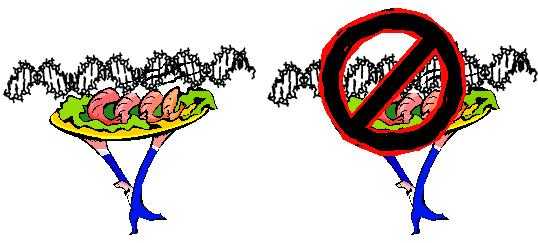
Genetically Modified Organisms
In
Support of Labeling Food Containing Products from Genetically Modified
Organisms.

Please
choose your food...
Today's controversy
surrounding food made from genetically altered organisms appears
to be one of this new technology – bad technology controversies
accompanying major lifestyle changes. The controversy is nicely
split between a scientific view and a public view. While scientists
deem genetically modified food safe, the public, particularly in
Europe, will not eat it. Americans are hardly aware of the issue
and don't know that many grocery store items already contain products
from genetically modified organisms. The low awareness of Americans
can mostly be attributed to lack of information. It is likely that
Americans would react similarly to GMO food as Europeans already
do. The industry thus is interested in not having to label its products.
A GMO label would be a kiss of death for any product in Europe and
likely stir sentiments in America too. A case in point is the recent
‘mix up’ of genetically modified corn (AT corn) not approved for
human consumption in taco shells and the like. The contaminated
food was immediately retracted. Labeling is akin to informing the
customer of a product he or she does not want.
Foes of ‘gene food’
press hard for a labeling in the hope that consumers will shun those
products. In a rare case of embracing capitalist principles, consumer
advocates and environmentalists are convinced that labeling would
eliminate GMO food by relying on consumers fear and subsequent lack
of demand. Such a market force is much more convincing (think shareholder
value) than intellectual debates.
The controversy surrounding
labeling or not, and the safety of GMO products, however, has a
deeper root than simple consumer protection. The resistance can
partly be explained by decades of industry public relation disasters
through stalling and late admissions of dangers and accidents harming
the environment. The biotechnology industry is feeling the full
force of previous public outcries leading to environmentalism and
consumer safety and protection. Hundreds of grassroots organizations
are well organized and can tap into (human) resources stemming from
anti nuclear power strategies in the 60s and 70s. Acid rain, smog,
heavy metal pollution, nuclear power plant meltdowns and near melt-downs,
oil spills and global warming, or animal testing are all part of
the greater scenario. Anti globalization protests around the world
(sic!) against corporate greed and arrogance are fueling many of
these sentiments against technological innovations.
Safety must come first.
Ironically, the biotechnology industry has done and is doing an
excellent job in this respect, yet the thought of manipulating the
very hereditary substance of plants and animals - our food
- is hard to swallow for most people. It is no surprise that
genetic manipulation is accepted in the biomedical field but not
when it comes to food. This separation into good and evil is particularly
strong in Europe.
What works for pills
does not necessarily work for food. This is obviously not a rational
argument, but can be understood by everyone. What we put in our
mouth is rather important to all of us and we hardly connect on
a rational level to food, even when counting calories, mineral dietary
allowances, or deciding whether to eat more unsaturated than saturated
fats.
Manipulating genetic
material also requires important reasons to do so. GMO techniques
are rarely used to change the quality of food, although this is
a major argument of the industry, but mostly to improve conditions
for growing, harvesting, processing, and storing/transport of food.
Genetic modification is used to decrease costs and increase revenues.
Subsequently, GMO food is eaten by millions of healthy people unlike
pills that are (or should be) taken rarely and temporarily and only
when we are sick. The question is if such modification are justified
to introduce potential risks for consumers and the environment.
The agricultural industry
can show that the GMO food on grocery shelves is safe to eat. Despite
of these overwhelming evidence, people are shunning the products,
if they know about these modifications. Despite of this resistance
I would suggest that labeling is necessary and fair to give the
consumer appropriate information. I would also suggest that given
the many benefits of gentechnology that labeling will soon turn
into a quality mark eventually helping to sell these products once
consumers are convinced of their safety and quality. The industry
can only win in the long term. This is about establishing trust
and being open and accessible.
The current debate about
danger and labeling of so called ‘Frankenstein foods’ strikes an
interesting resemblance to a labeling dispute that happened over
a century ago. Then, the British in order to protect their national
market from German goods, forced German manufacturer to label their
products as 'Made in Germany', a label that mutated itself into
a 'trademark' because those products often were superior to their
British counterparts.
Man
& Machine | Genetic
Engineering | Clones
& Genomes | Risks
& Ethics | Microbes
& Diseases
Home
| In the news
Copyright © 2001-2003 Lukas
K. Buehler
|